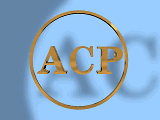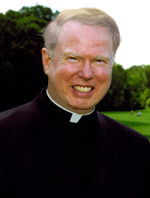Introduction of Justice Antonin Scalia
by Justice Anne Burke
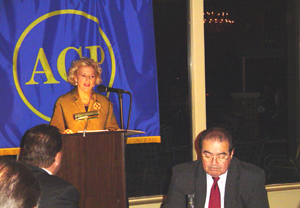 It
is an honor and a pleasure for me to welcome Justice Antonin Scalia to
the American Catholic Press on the occasion of his acceptance of the
Gratiam Dei Award.
It
is an honor and a pleasure for me to welcome Justice Antonin Scalia to
the American Catholic Press on the occasion of his acceptance of the
Gratiam Dei Award.
Justice
Antonin Scalia was born in Trenton, New Jersey, and studied in both
private and Catholic parochial schools as a boy. He graduated
valedictorian of his class from Georgetown University and then studied
at Harvard Law School, where he was both editor of the Law Review and a graduate summa cum laude.
Justice
Scalia was in private practice in Cleveland, Ohio, before accepting a
teaching position at the University of Virginia Law School. He
then turned to public service, working in both the Nixon and Ford
Administrations, before returning in 1977 to the academic world to
teach law here, at the University of Chicago Law School.
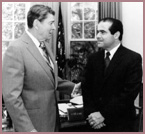 In
1982, he was appointed by President Ronald Regan to the United States
Court of Appeals for the District of Columbia Circuit. He was
appointed Supreme Court Justice in 1986, his nomination confirmed with
astonishing unanimity by a Senate vote of 98-0.
In
1982, he was appointed by President Ronald Regan to the United States
Court of Appeals for the District of Columbia Circuit. He was
appointed Supreme Court Justice in 1986, his nomination confirmed with
astonishing unanimity by a Senate vote of 98-0.
Since
joining the Court, Justice Scalia has issued hundreds of opinions
addressing a multitude of difficult and contentious issues. His
opinions have been studied avidly by students of the law everywhere,
both for the elegance of their arguments and their candor of
expression. He is regarded as one of the most brilliant legal
minds of our time.
The
stated goal of the Gratiam Dei Award is to recognize "important and
outstanding service to the American Catholic Press, to the liturgy of
the Catholic Church, or to the common good."
We
gather tonight to honor Justice Scalia for his tremendous contribution
to the common good of this country, including the Catholic Church, of
which he is a devoted member.
As
a member of the United States Supreme Court, Justice Scalia must rule
on the most fundamental issues of constitutional interpretation.
Of these issues, he has been perhaps the most outspoken in his opinions
upholding the right of the individual to practice the religion of his or
her choice and in his interpretations of the Establishment Clause of
the First Amendment, which forbids the preferential establishment of any
particular religion by our government.
We here are people of faith; and we know that without our faith, we are lost. Justice Scalia
has been a great champion of Catholics and of all people of
faith. In his opinions for the Court, he has consistently
recognized the important role that religion has played both in American
history and in the daily lives of millions of Americans today. He
has stressed the need for acknowledgement, tolerance, and accommodation
of all religious expression. As he stated in his dissent in Lee v. Weisman,
Justice Scalia has given voice to the reality that "religious men and
women of almost all denominations have felt it necessary to acknowledge
and beseech the blessing of God as a people."
While
others have been openly critical of any display of religious belief in
civic life, Justice Scalia has taken a different stance. Perhaps
more than any other Supreme Court Justice in our memory, he has
realized, as he again stated in Lee, that "maintaining respect
for the religious observations of others is a fundamental civic virtue
that government (including the public schools) can and should
cultivate."
At the
same time, he has never lost sight of the importance of separation of
church and state and has said that, "while American Founding Fathers did
not want the federal government to 'establish' one official religion,
they did not intend for faith to be completely removed from public
life."
Nor does
Justice Scalia allow his religious views to influence his
judgements. We know this by his own words, when he says:
"The
only one of my religious views that has anything to do with my job as a
judge is the need to follow the commandment, 'Thou shall not
lie.' I try to observe that faithfully."
Justice
Scalia is a friend to us by being a friend of the law, a man of the
Catholic faith who administers the law with impartiality. He is a
man of principle, integrity, and action.
Legal scholars call him an "originalist," by 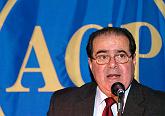 which they mean he interprets the law
in the light of the original intentions of the framers of the United
States Constitution. But they may well call him that because
(whether one disagrees or agrees with his opinions) all recognize in
Justice Scalia an original and principled thinker who interprets the law
justly.
which they mean he interprets the law
in the light of the original intentions of the framers of the United
States Constitution. But they may well call him that because
(whether one disagrees or agrees with his opinions) all recognize in
Justice Scalia an original and principled thinker who interprets the law
justly.
As a
Catholic and a judge myself, I know well that it is ultimately his faith
that is his anchor when he navigates the deep water of his awesome
responsibility.
I am pleased to join with you tonight in honoring Justice Antonin Scalia!
 It
is an honor and a pleasure for me to welcome Justice Antonin Scalia to
the American Catholic Press on the occasion of his acceptance of the
Gratiam Dei Award.
It
is an honor and a pleasure for me to welcome Justice Antonin Scalia to
the American Catholic Press on the occasion of his acceptance of the
Gratiam Dei Award. In
1982, he was appointed by President Ronald Regan to the United States
Court of Appeals for the District of Columbia Circuit. He was
appointed Supreme Court Justice in 1986, his nomination confirmed with
astonishing unanimity by a Senate vote of 98-0.
In
1982, he was appointed by President Ronald Regan to the United States
Court of Appeals for the District of Columbia Circuit. He was
appointed Supreme Court Justice in 1986, his nomination confirmed with
astonishing unanimity by a Senate vote of 98-0. which they mean he interprets the law
in the light of the original intentions of the framers of the United
States Constitution. But they may well call him that because
(whether one disagrees or agrees with his opinions) all recognize in
Justice Scalia an original and principled thinker who interprets the law
justly.
which they mean he interprets the law
in the light of the original intentions of the framers of the United
States Constitution. But they may well call him that because
(whether one disagrees or agrees with his opinions) all recognize in
Justice Scalia an original and principled thinker who interprets the law
justly.